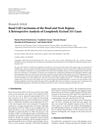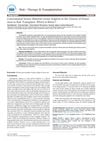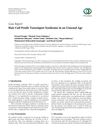 4 citations,
January 2021 in “Dermatologic Therapy”
4 citations,
January 2021 in “Dermatologic Therapy” AI is effective in diagnosing and treating hair disorders, including detecting hair loss and scalp conditions with high accuracy, but it should supplement, not replace, doctor-patient interactions.
 3 citations,
January 2018 in “Open Access Macedonian Journal of Medical Sciences”
3 citations,
January 2018 in “Open Access Macedonian Journal of Medical Sciences” Implant safely and effectively treats hair loss.
 January 2017 in “International journal of transplantation & plastic surgery”
January 2017 in “International journal of transplantation & plastic surgery” Hair restoration techniques have improved over time, focusing on better results and less scarring, but skilled doctors are essential for natural-looking outcomes.
 September 1997 in “Dermatologic Surgery”
September 1997 in “Dermatologic Surgery” Hair restoration has greatly improved, allowing for natural-looking hairlines and better results.
 29 citations,
January 2010 in “PubMed”
29 citations,
January 2010 in “PubMed” FUE hair transplants offer minimal scarring and are good for short hairstyles but are time-consuming and can be costly.
 20 citations,
August 2016 in “International Journal of Cancer”
20 citations,
August 2016 in “International Journal of Cancer” Men with male pattern baldness have a higher risk of certain skin cancers, especially on the scalp.
 20 citations,
January 2014 in “Journal of skin cancer”
20 citations,
January 2014 in “Journal of skin cancer” Most people with basal cell carcinoma on their head or neck were 60-70 years old, and it often came back even after being fully removed, especially in certain areas and types.
 19 citations,
January 2017 in “Stem Cells International”
19 citations,
January 2017 in “Stem Cells International” Adipose-derived stem cells show promise in treating skin conditions like vitiligo, alopecia, and nonhealing wounds.
 15 citations,
March 2020 in “Anais Brasileiros De Dermatologia”
15 citations,
March 2020 in “Anais Brasileiros De Dermatologia” Finasteride may cause lasting sexual, mental, and physical symptoms; use with caution.
 15 citations,
March 2014 in “General Hospital Psychiatry”
15 citations,
March 2014 in “General Hospital Psychiatry” Patients with schizophrenia have a high rate of skin diseases, with fungal infections and dermatitis being most common, and those on clozapine have a lower risk of fungal infections.
 7 citations,
January 2009 in “Immunological investigations”
7 citations,
January 2009 in “Immunological investigations” A 3-year-old boy lost all his hair due to a rare reaction to phenobarbital, but it grew back after steroid treatment.
 2 citations,
January 2015 in “Hair therapy & transplantation”
2 citations,
January 2015 in “Hair therapy & transplantation” Both sutures and staplers are equally effective for hair transplant donor area closure, but staplers are faster and easier to use.
 October 2023 in “Al-Anbar medical journal”
October 2023 in “Al-Anbar medical journal” The clinic-based hair fall count method is accurate and reliable.
 April 2021 in “Advances in Cosmetic Surgery”
April 2021 in “Advances in Cosmetic Surgery” Hair restoration can be achieved through non-surgical treatments like minoxidil, antiandrogens, phototherapy, and PRP procedures, or through surgical methods like hair transplantation. Continued treatment is needed to maintain results, and full results are visible after 12-18 months.
 January 2009 in “International Journal of Trichology”
January 2009 in “International Journal of Trichology” Dr. Shyam B Verma encourages more scientific research on hair disorders and criticizes the unscientific hair care market in India.
 January 2006 in “Journal of Rural Medicine”
January 2006 in “Journal of Rural Medicine” Trichotillomania is more common than previously thought, with increasing diagnosed cases.

research Acne
231 citations,
April 2005 in “The New England Journal of Medicine” Acne affects most teenagers and can continue into adulthood, with various treatments available that show improvement but have concerns like antibiotic resistance and side effects.
 57 citations,
May 2016 in “Journal of Dermatological Treatment”
57 citations,
May 2016 in “Journal of Dermatological Treatment” PRP therapy may effectively treat hair loss, but more research needed.
 24 citations,
December 2018 in “Life sciences”
24 citations,
December 2018 in “Life sciences” Lysophosphatidic acid is important for skin health and disease, and could be a target for new skin disorder treatments.
 16 citations,
May 2011 in “Dermatologic therapy”
16 citations,
May 2011 in “Dermatologic therapy” Effective treatments for severe alopecia areata are still lacking.
 13 citations,
March 2018 in “Journal of Sociology”
13 citations,
March 2018 in “Journal of Sociology” The anti-ageing treatment market is growing by exploiting fears of ageing with unproven promises, which could harm public trust and genuine science.
 12 citations,
August 2011 in “European Journal of Endocrinology”
12 citations,
August 2011 in “European Journal of Endocrinology” Anti-Müllerian hormone is a specific marker for ovarian issues in women with conditions like PCOS.
 11 citations,
July 2017 in “Expert Opinion on Investigational Drugs”
11 citations,
July 2017 in “Expert Opinion on Investigational Drugs” New hair loss treatments may include topical medications, injections, and improved transplant methods.
 8 citations,
January 2015 in “Journal of Cutaneous Medicine and Surgery”
8 citations,
January 2015 in “Journal of Cutaneous Medicine and Surgery” Hair restoration techniques have improved but still rely on limited donor hair, with new methods like cloning and gene therapy being explored.
 4 citations,
October 2019 in “Journal of Dermatological Treatment”
4 citations,
October 2019 in “Journal of Dermatological Treatment” Monofilament Threads significantly improve hair growth in women with pattern hair loss and are safe.
 4 citations,
January 2015 in “Case reports in urology”
4 citations,
January 2015 in “Case reports in urology” An 8-year-old boy recovered from a rare case of penile tourniquet syndrome after hair removal surgery.
 3 citations,
August 2022 in “Curēus”
3 citations,
August 2022 in “Curēus” The SARS-CoV-2 vaccine may be linked to triggering autoimmune conditions like Alopecia Areata.
 2 citations,
April 2021 in “Naukovì gorizonti”
2 citations,
April 2021 in “Naukovì gorizonti” Effective treatment significantly improves pododermatitis in dogs, reducing symptoms and extending remission.
 2 citations,
August 2011 in “InTech eBooks”
2 citations,
August 2011 in “InTech eBooks” New methods for growing skin cells can improve skin grafts by building blood vessels within them.
 2 citations,
October 1998 in “Family Practice”
2 citations,
October 1998 in “Family Practice” New oral treatment, finasteride, effectively and safely treats common hair loss.





























